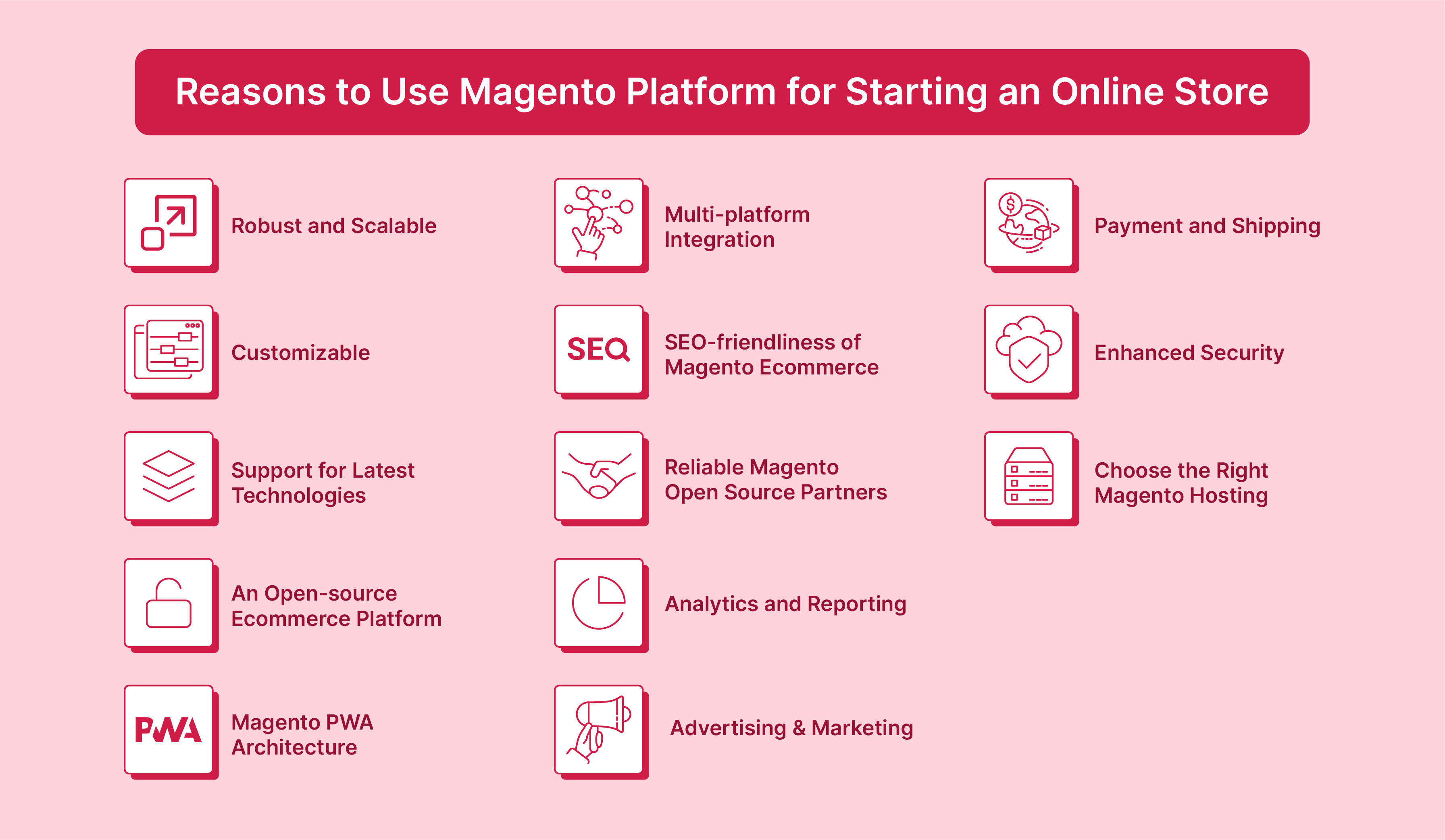
Why Choose a Magento Platform to Kickstart Your Ecommerce Business?
The Magento platform provides a robust and flexible e-commerce solution for businesses of all sizes. Its open-source architecture enables easy customization and integration with third-party extensions, making it perfect for creating unique online stores. Magento's e-commerce store features top brands like LandRover, CocaCola, Jaguar, etc. This article will explore the benefits of using the Magento platform for your e-commerce business.
Key Takeaways
-
Understand the Magento platform and why it is the ideal solution for e-commerce businesses.
-
Discover how Magento's open-source architecture facilitates easy customization and integration with third-party extensions.
-
Learn how Magento's robust and flexible e-commerce solution can cater to businesses of any size.
-
Delve into features like B2B capabilities, scalability, and multi-store management, making Magento a popular choice for businesses worldwide.
-
Find FAQs for those looking to start their e-commerce business on the Magento platform.
What is the Magento Platform?
Magento is an open-source e-commerce platform owned by Adobe Inc. It was first released in 2008 and has become a leading e-commerce solution for businesses worldwide. Magento offers two main products: Magento Open Source (formerly Community Edition) and Magento Commerce (formerly known as Enterprise Edition).
The platform is written in PHP and uses MySQL for database management. Its modular architecture allows developers to customize the platform according to their business needs. Magento is a flexible e-commerce platform that offers customizable options, built-in features, and seamless integration with third-party plugins, themes, and tools. It caters to various ecommerce businesses, from small flower shops to major fashion brands to B2B enterprises.
What is the Role of Magento Platform for E-commerce Stores?
The Magento platform offers a robust shopping cart system. It seamlessly interfaces with multiple payment options, ensuring a smooth checkout process for customers. With Magento's unparalleled scalability, businesses can start small and expand as demand increases. This is one reason why it stands out among other e-commerce platforms.
Given its open-source nature, a developer can access and modify the Magento source code, tailoring it to fit a company's unique needs. This level of control can create bespoke e-commerce experiences that differentiate businesses in a crowded market. Furthermore, Magento's version control enables efficient management of thousands of products, promotions, and sales events. It caters to both B2C and B2B enterprises.
Magento also serves as a repository of customer and product information, providing vital insights that inform strategic decision-making. Setting up a Magento store may have a higher initial cost than other platforms. However, its long-term benefits and control make it a wise investment for growth-oriented businesses.
13 Reasons to Use Magento Platform for Starting an Online Store

1. Robust and Scalable
Magento's open-source architecture offers a robust and scalable solution for small to large businesses. The platform can handle high traffic volumes, making it suitable for growing online stores. Magento can grow with you as your business grows, providing a stable and reliable platform for your e-commerce needs.
2. Customizable
One of the main advantages of using Magento is its customization capabilities. The platform offers unlimited options for customizing your online store's design, layout, features, and functionalities. This flexibility allows businesses to create unique and personalized shopping experiences for their customers, setting them apart.
3. Support for Latest Technologies
Magento Open Source is developed using the Zend framework. It can run on both Nginx and Apache servers. To ensure optimal ecommerce performance, Redis and Varnish cache are required. Magento also supports the latest versions of PHP, MariaDB, MySQL, Composer, Elasticsearch, OpenSearch, and other technologies. This ensures that Magento ecommerce merchants always have access to the best tools for their business.
4. An Open-source Ecommerce Platform
Merchants using Magento ecommerce can customize their online stores to their liking. They can easily integrate third-party solutions and add or develop any desired functionality.
5. Magento PWA Architecture
A magento e-commerce solution can be integrated with any Magento PWA solution to provide an e-commerce store with the appearance and functionality of a native app. This creates a powerful combination of a Magento website and a native app. With Magento PWA, you can enhance the shopping experience by offering lightning-fast speed, app-like performance, push notifications, offline mode, flexibility, an easy-to-use interface, and other essential features.
6. Multi-platform Integration
Magento Open Source merchants can improve their store's functionality using third-party extensions. These extensions can be sourced from the Magento marketplace or other extension providers.
7. SEO-friendliness of Magento Ecommerce
Organic channels are vital in driving conversions for ecommerce stores, with SEO being the most effective channel. Magento Ecommerce CMS offers a search engine-friendly infrastructure and built-in features, enabling merchants to optimize their product rankings and boost sales.
8. Reliable Magento Open Source Partners
Magento's partners have been crucial to the success of Magento's e-commerce. Merchants will always choose an ecommerce platform with excellent partners. Magento Open Source partners range from third-party solutions to Magento agencies.
9. Analytics and Reporting
Having a robust analytics and reporting system is crucial to ensure an e-commerce business's success. Magento Open Source provides precise reports for merchants. These reports cover various aspects such as sales, tax, abandoned shopping carts, best-viewed products, and best-purchased products. Additionally, they provide insights on low stock, search terms, product reviews, coupon usage, and total sales invoices.
10. Advertising & Marketing
Magento Open Source provides various powerful marketing features to keep customers engaged. You can cross-sell products, generate and track coupon codes, manage newsletters and polls, and receive support for price variations based on groups and quantity. Plus, you can seamlessly integrate third-party marketing and promotion tools for even more effectiveness.
11. Payment and Shipping
Magento is an ecommerce platform that provides a range of payment options and integrations for easy transactions. Merchants can select system-generated shipping choices or integrate external solutions to enhance the customer experience.
12. Enhanced Security
Magento Open Source regularly provides new security updates and fixes. It has enhanced password management with improved hashing algorithms (SHA-256) and support for Argon2ID13 via the PHP sodium extension. The platform has also implemented measures to prevent cross-site scripting by regulating data release. Additionally, Magento Open Source offers improved file system ownership and permissions, allowing for flexible configuration.
13. Choose the Right Magento Hosting
Merchants using the Magento e-commerce platform can select their preferred e-commerce hosting provider. They can choose from shared hosting (not recommended), virtual private servers, cloud hosting, or managed Magento hosting solutions, the most popular options.
5 Tips to Manage Your Magento Store Effectively
1. CRM Integration in Magento

CRM is a technology that helps businesses manage customer data effectively. It stands for Customer Relationship Management. Store owners should use it for:
-
Data management: Utilize a CRM system to collect, monitor, and share data. Save time on data management by syncing data.
-
Meet customer demands: Create marketing campaigns, emails, and chat centers. Use case management systems to keep track of customer needs. Automate tasks and services through the CRM system.
-
Enhance user engagement: With CRM, analyze customer behavior, identify trends, and gather customer reviews. Check customer history to improve the online shopping experience.
2. Use Managed Magento Hosting

Magento hosting backend workloads are complex. Managed Magento hosting is a service where your hosting provider handles server and software management. They take care of all technical and maintenance tasks, freeing you from worries about maintaining your Magento store.
Managed Magento hosting offers a range of features, including migration, hourly backups, security updates, cache management, monitoring, compliance, certifications, firewalls, and data encryption. By delegating these tasks to a reliable hosting provider, you save time and can focus on efficiently growing your Magento store.
3. Inventory and Order Management Software

Inventory management in real-time: Keep track of your inventory status effortlessly. Get instant updates on stocks from multiple locations. Streamline orders and add new sources and products.
Efficient order management: Simplify returns, refunds, and order replacements. Stay on top of product stocks with order management tools. Track packages from physical stores.
Streamlined inventory management: Avoid low stocks and canceled orders. Utilize inventory management tools for a centralized system. Manage inbound orders and goods from a single admin panel.
4. Use Magento Extensions to save time

Use the SEO suite extension to easily update meta tags, alt text, and URLs for your large product categories. Manual updates can be time-consuming. Boost compliance and save time with the Magento 2 GDPR extension, ensuring your online stores meet GDPR requirements and helping you avoid penalties.
Save time on social media management by using social media management tools for your store. Easily log in and engage with customers while sharing high-quality content.
Enhance order management with the order status extension, offering push notifications to inform customers about their shipments. Edit order statuses and efficiently handle data from various sources. Simplify regional targeting with the GeoIP Detection and Redirect extension. Automatically redirect users to regional storefronts based on location, adjusting store view, languages, and currencies.
5. Outsource Marketing

When you outsource marketing tasks, you can accelerate sales. Let professional marketing teams help your Magento store reach potential customers. They can assist with SEO, content creation, and social media management.
By outsourcing these tasks, you can focus on other important business aspects. Magento ecommerce marketing agencies offer services such as paid advertising, content management, branding, and improving sales and traffic.
Additionally, you can create responsive designs specifically for mobile devices. This helps with responsiveness and provides endless possibilities for personalization.
With the Magento Platform, you can easily integrate various marketing tools and analytics to track customer behavior and engagement. This allows for targeted marketing campaigns and a better understanding of your customer base.
FAQs
1. How do Magento platforms impact the number of things a company can do with their websites?
Magento platforms provide robust customization options. This allows companies to optimize web pages, integrate various applications, and handle sizable traffic, ultimately enhancing their ecommerce solution and meeting organizational goals.
2. Which are some of the best payment gateways to integrate with Magento platforms?
Paypal, Stripe, and Square are among the top choices for payment gateways on Magento platforms. They provide a secure way of processing payments, enhancing customers' trust and loyalty.
3. How does Magento address common issues on ecommerce platforms?
Magento constantly updates its platform to ensure optimal performance. It also addresses common issues like slow-loading pages, payment method problems, and optimization for changes in customer behavior.
4. What's the difference in customer experiences between Magento and other ecommerce platforms?
Magento offers a superior customer experience by providing a streamlined shopping experience, easy navigation, and personalized content. Its flexibility to integrate with various apps also sets it apart from other platforms.
Summary
The Magento platform offers enhanced user experiences, robust customization, and effective solutions to common issues in e-commerce. With its continuous updates and improvements, Magento remains a top choice for online stores seeking to expand their online presence. With the right Magento-managed hosting, businesses can ensure smooth e-commerce website operations that meet their goals.



